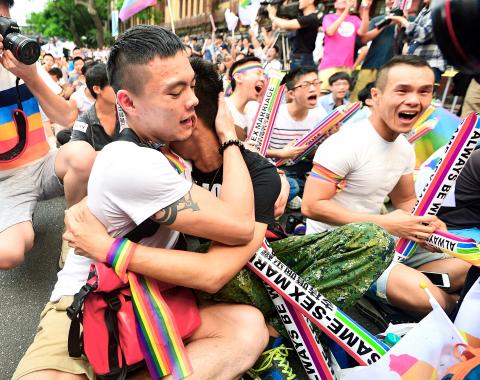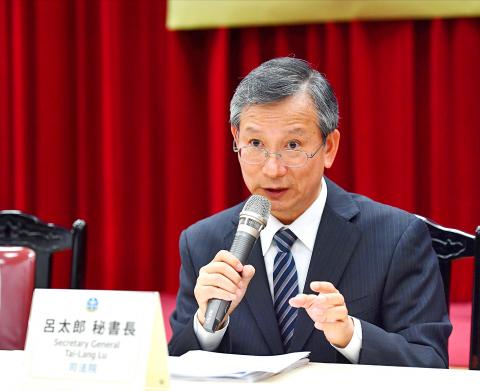The Council of Grand Justices yesterday ruled that the Civil Code, which says an agreement to marry can only be made between a man and a woman, “violated” constitutional guarantees of freedom of marriage and equality.
The landmark Constitutional Interpretation No. 748 rules in favor of allowing homosexual couples to register for marriage, and grand justices have asked the legislature to amend relevant laws within two years to protect the interests of homosexuals.
If the government has not changed the law in two years, same-sex couples will be allowed to register their union at household registration offices, Judicial Yuan Secretary-General Lu Tai-lang (呂太郎) said.

Photo: Wang Yi-sung, Taipei Times
The Civil Code violates the freedom of marriage and equal rights for all citizens as guaranteed by the Constitution, Lu said.
The grand justices made the ruling after receiving two requests for a constitutional interpretation of the issue.
One request was filed by veteran gay rights advocate Chi Chia-wei (祁家威) in 2015 after his attempt to register his same-sex marriage was rejected by Taipei’s Wanhua District (萬華) household registration office in 2013 and subsequent court appeals failed.

Photo: CNA
The other request was filed by the Taipei Department of Civil Affairs in 2015, after three same-sex couples filed an administrative lawsuit against the government after their marriage registrations were rejected by the department.
Justice Huang Jui-ming (黃瑞明) abstained from the vote and took no part in deliberations, the ruling said.
Dissenting opinions were filed by Justice Huang Horng-shya (黃虹霞) and Justice Wu Chen-huan (吳陳鐶).
“Marriage is a union between a man and a woman, who live life together as an institution, which is protected by the Constitution. Making changes would involve altering social and cultural values, which should not be made by merely copying developments in other nations... Therefore, the decision to legalize same-sex marriage should be made by a referendum,” Wu said.
It is a fallacy to rule that Civil Code provisions are unconstitutional, Huang Horng-shya said.
Same-sex marriage is not a fundamental human right to be universally protected, she said.
She said that she supports legislating legal protections of civil unions for same-sex adults, but does not view a homosexual union the same way as a marriage between a man and a woman.
Among the main reasons cited for the majority decision were that prior interpretations mentioning “husband and wife” or “a man and a woman” were made within the context of heterosexual marriage.
“This court has not made any interpretation on the issue of whether two people of the same sex are allowed to marry,” the ruling said.
The Civil Code does not require the ability to procreate as a requirement for marriage and reproduction is not an essential element of marriage, the ruling said, adding that procreation should not be an essential element of marriage.
Opposition to same-sex marriage based on safeguarding social and ethical values is incompatible with the spirit and meaning of equal rights as protected by the Constitution, the ruling said.
The Judicial Yuan also issued a three-page abstract on the ruling in Chinese and English, to accompany Constitutional Interpretation No. 748, which is 24 pages long.
Legal experts said it was rare for the Judicial Yuan to issue an English-language statement of a constitutional interpretation. They see the move as an official declaration to the international media of the decision that has made Taiwan the first Asian nation to recognize same-sex unions.
In response to media queries over whether same-sex foreign nationals could register their marriage in Taiwan, Lu did not give a direct answer, but said they would have to abide by provisions in the Act Governing the Choice of Law in Civil Matters Involving Foreign Elements (涉外民事法律適用法).
additional reporting by CNA

MORE VISITORS: The Tourism Administration said that it is seeing positive prospects in its efforts to expand the tourism market in North America and Europe Taiwan has been ranked as the cheapest place in the world to travel to this year, based on a list recommended by NerdWallet. The San Francisco-based personal finance company said that Taiwan topped the list of 16 nations it chose for budget travelers because US tourists do not need visas and travelers can easily have a good meal for less than US$10. A bus ride in Taipei costs just under US$0.50, while subway rides start at US$0.60, the firm said, adding that public transportation in Taiwan is easy to navigate. The firm also called Taiwan a “food lover’s paradise,” citing inexpensive breakfast stalls

TRADE: A mandatory declaration of origin for manufactured goods bound for the US is to take effect on May 7 to block China from exploiting Taiwan’s trade channels All products manufactured in Taiwan and exported to the US must include a signed declaration of origin starting on May 7, the Bureau of Foreign Trade announced yesterday. US President Donald Trump on April 2 imposed a 32 percent tariff on imports from Taiwan, but one week later announced a 90-day pause on its implementation. However, a universal 10 percent tariff was immediately applied to most imports from around the world. On April 12, the Trump administration further exempted computers, smartphones and semiconductors from the new tariffs. In response, President William Lai’s (賴清德) administration has introduced a series of countermeasures to support affected

CROSS-STRAIT: The vast majority of Taiwanese support maintaining the ‘status quo,’ while concern is rising about Beijing’s influence operations More than eight out of 10 Taiwanese reject Beijing’s “one country, two systems” framework for cross-strait relations, according to a survey released by the Mainland Affairs Council (MAC) on Thursday. The MAC’s latest quarterly survey found that 84.4 percent of respondents opposed Beijing’s “one country, two systems” formula for handling cross-strait relations — a figure consistent with past polling. Over the past three years, opposition to the framework has remained high, ranging from a low of 83.6 percent in April 2023 to a peak of 89.6 percent in April last year. In the most recent poll, 82.5 percent also rejected China’s

PLUGGING HOLES: The amendments would bring the legislation in line with systems found in other countries such as Japan and the US, Legislator Chen Kuan-ting said Democratic Progressive Party (DPP) Legislator Chen Kuan-ting (陳冠廷) has proposed amending national security legislation amid a spate of espionage cases. Potential gaps in security vetting procedures for personnel with access to sensitive information prompted him to propose the amendments, which would introduce changes to Article 14 of the Classified National Security Information Protection Act (國家機密保護法), Chen said yesterday. The proposal, which aims to enhance interagency vetting procedures and reduce the risk of classified information leaks, would establish a comprehensive security clearance system in Taiwan, he said. The amendment would require character and loyalty checks for civil servants and intelligence personnel prior to